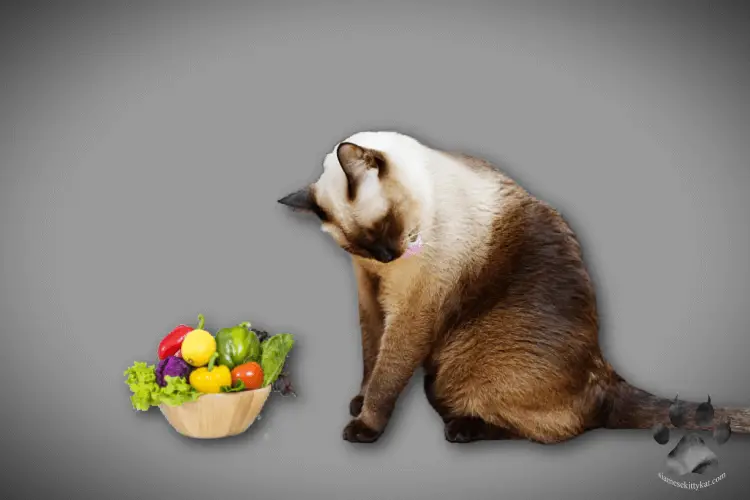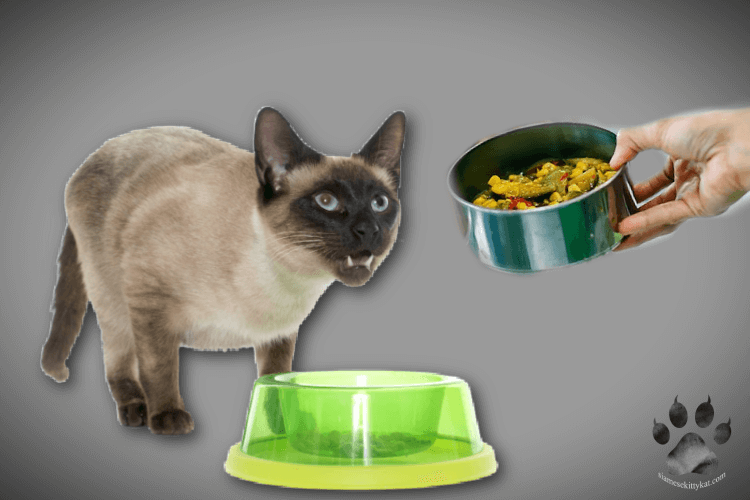Having a vegetarian diet can be beneficial for humans in many ways. It reduces the risk of certain diseases and helps to manage weight. However, there may be better ideas than this when it comes to cats.
I have two Siamese cats, Batman and Robyn, who I adore. They’re quite the characters and love getting into all sorts of mischief. One thing they love more than anything is their food – especially meat.
I was confused at first about why my felines prefer a carnivorous diet over vegetables. After researching, I learned that cats need to eat meat for essential nutrients that aren’t available in plant-based diets. They can become ill or suffer health issues without these nutrients.
This article will explore more about what happens when you feed a Siamese cat a vegetarian diet. Read on to learn more!
Can a Siamese Cat Survive on a Vegetarian Diet?
Siamese cats cannot survive on a vegetarian diet, as they are obligate carnivores.
Obligate carnivores need an animal-based diet to survive. Plant-based foods do not provide the essential nutrients for good health and longevity.
It’s true that Siamese cats need an animal-based diet for optimal
health, but you can still feed them some fruits and vegetables in
small amounts. These should only supplement their existing diet. They should never replace their main source of nutrition.
You should use them as treats or as something fun to munch on once in a while.
What Happens if You Feed a Cat a Vegetarian Diet?

Feeding a cat a vegetarian or vegan diet is something some people might consider. However, experts do not recommend it.
There are potential consequences if you feed a cat a vegetarian diet.
1. The cat could become malnourished if he is not getting enough of the right nutrients.
Malnutrition can lead to long-term health problems such as:
It can also trigger diseases such as diabetes or renal failure later in life. Moreover, inadequate nutrition can lead to undesirable behaviors such as aggression or depression.
2. Taurine is an amino acid found only in animal proteins. This plays an essential role in eye development or vision. Taurine deficiencies can lead to blindness.
Cats cannot synthesize this vital nutrient, so you must provide it through their diet.
3. Your cat may experience intestinal problems. This is because their digestive systems are not designed to process plant-based material. This can lead to chronic diarrhea, vomiting, dehydration, and nutrient malabsorption.
4. Vegetarian diets often lack fatty acids such as arachidonic and linoleic acid. These are necessary for maintaining healthy skin and fur coats in cats. Your cat’s fur may become dry and brittle if fed a vegetarian diet for an extended period.
5. Cats who consume a vegetarian diet may have a higher risk of urinary tract problems. Plant-based proteins are difficult for cats’ bodies to break down and digest. This leads to blockages or infections in their urinary tract.
6. Cats are anatomically built like hunters; their bodies need meat to stay nourished. Thus, your cat may be less satisfied with a vegetarian diet and may start to beg for food more often.
Can Siamese Cats Eat Human Food?

Siamese cats can eat human foods, but it’s essential to choose the right foods and feed them in moderation.
Stick to nutritious and low-fat content when selecting human foods for your Siamese cat. Lean meat, such as cooked turkey or ham, can be a great choice. These will provide much-needed protein and other essential vitamins and minerals.
Some types of seafood, like tuna or salmon, can work well. However, you should avoid them if they contain added oils or spices. This can only upset the sensitive digestive system of your cats.
There are also some things to keep in mind:
However, you should avoid giving your cat processed meats such as hot dogs or sausages. This is due to their high-fat content and preservatives, which can upset your cat’s stomach.
You could buy natural treats for cats at pet stores or online retailers.
No matter what type of food you give your Siamese cat, they must always stay hydrated. Encourage your Siamese friend to drink plenty of water every day. You could leave several water dishes around the house so they can always access them.
A wet food diet is also great for increasing your cat’s water intake. Ensure you look after your Siamese cat as with any other pet. Ensure they receive proper nutrition through a balanced diet.
A vegetarian diet can be beneficial in certain situations. However, switching a Siamese cat to an all-vegetable diet is not recommended.
Cats, like all obligate carnivores, need a certain amount of protein from animal sources to stay healthy. Cutting out the meat in a cat’s diet can lead to nutritional deficiencies. Some cats suffer from severe medical conditions that lead to death.
You should consult a vet first, even if you decide to switch your Siamese cat’s diet to vegetarian. Closely monitor your cat’s health afterward.
A veterinarian can help assess the risk of malnutrition. They can design an individualized plan that meets your cat’s nutritional needs.
Furthermore, it’s best to transition your cat slowly, as with any change in diet. Your cat can adjust well and get used to his new lifestyle this way.
We gathered all the health tips tailored toward maintaining your Siamese cat’s optimal well-being. Check it out here: Siamese Cat Health: A Complete Guide
